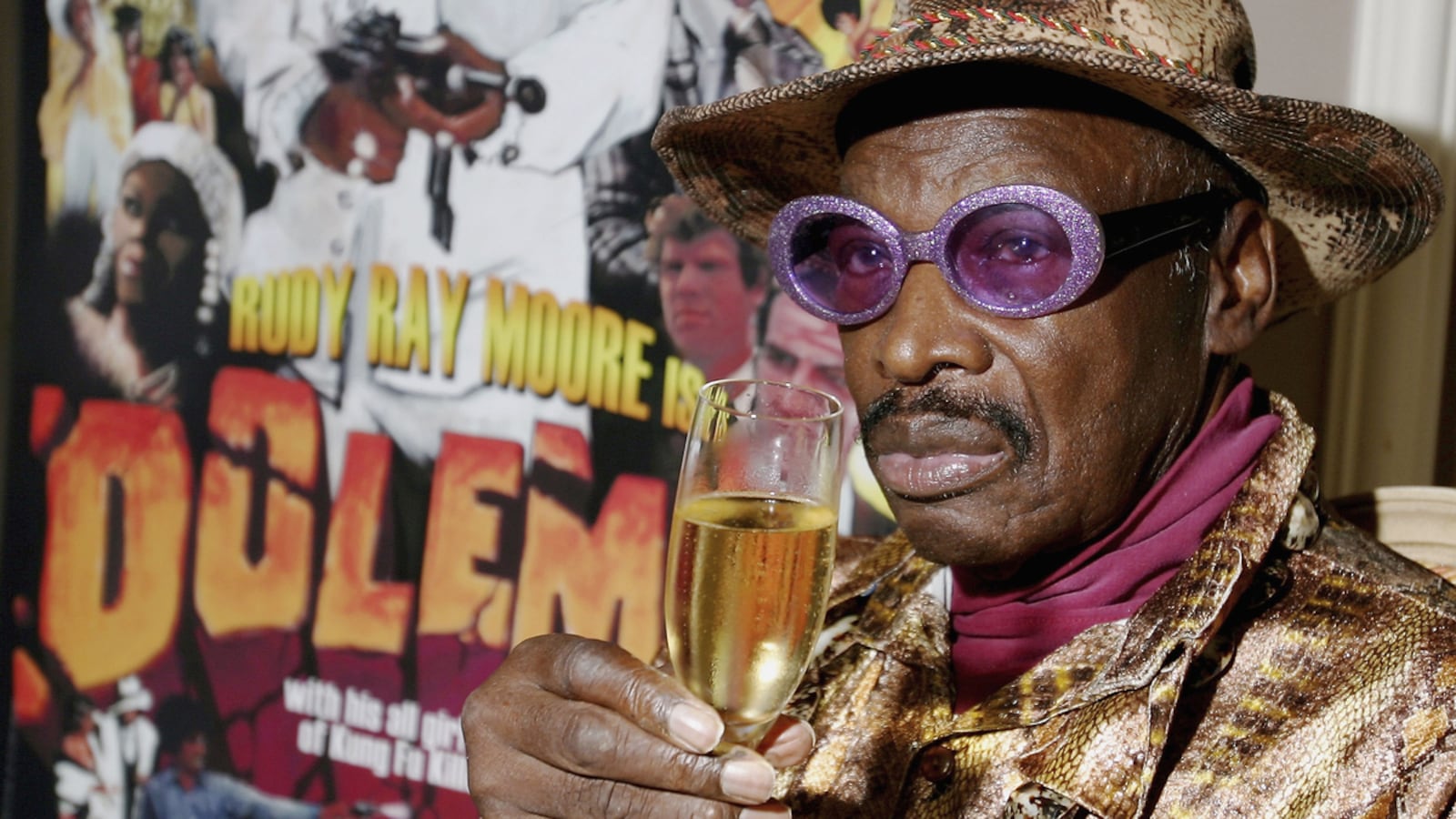Eddie Murphy must be nuts. Or brave. Maybe a bit of both? That was my reaction when I heard that in his highly anticipated career reboot, Dolemite Is My Name, Murphy was setting out to make a big-name, big-budget movie about a man who worked in the outer precincts of Hollywood, making raunchy comedy records and no-name, no-budget blaxploitation flicks that had no desire to become mainstream hits and, for that very reason, became revered cult favorites with black audiences.
The man’s name was Rudy Ray Moore, and his greatest creation was Dolemite, an acid-tongued, kung fu-kicking ghetto pimp who was a master of toasting, an oral tradition imported from West Africa, verbal sparring contests to tell the tallest tale or land the most devastating insult. And so when Dolemite wants a corrupt cop to get out of his way, he doesn’t say, “Please.” He says, “Man, step aside and let me pass, fore they have to be pulling these Hush Puppies out yo muthafuckin’ ass.” (Hush Puppies as certified 1970s pimp footwear!) An enemy isn’t merely an enemy to Dolemite, he’s a “no-business, born-insecure, rat-soup-eatin’ junkyard muthafucka.” And to anyone who is doing anything halfway, Dolemite has a standard rebuke: “Put your weight on it!”
As Moore’s 1975 debut movie, Dolemite, and his home-made party records and stand-up act were acquiring cult status, he refused to tone down the braggadocio or the raunch in order to win the approval of mainstream—that is, white—audiences. He proudly dubbed himself “the first X-rated comedian.” The titles of the routines on his party records lay it all out: “Mr. Big Dick,” “Pimpin’ Sam,” “Back Up and Get This Load,” and “Hell of a Blow Job,” to name a few. It wasn’t only about sex. In 1972 he mounted a mock campaign for president against Richard Nixon and George McGovern. On the resulting record, a “reporter” asks the “candidate” what he promises to do about unemployment. Moore replies, “I ain’t promising you a goddamn thing. I would open up stealin’. Fuck a job!” Disillusioned black audiences thrilled at the transgressive candor.
While other black comedians, including Bill Cosby, Flip Wilson, and even Redd Foxx and Richard Pryor, were working hard to find the crossover sweet spot, Moore chose to “stay on the fringes, below white society’s radar,” in the words of Jim Dawson, author of The Compleat Motherfucker, a book-length study of the evolution of profanity in American comedy. Its low budget and low production values set Dolemite apart from the era’s slick productions aimed at black audiences, including Shaft and SuperFly. Dolemite, like its creator, was all about making do with what you’ve got. What wound up on the screen may have looked cheesy, but it was deliriously so. The wooden fight scenes, the flubbed dialogue, the visible microphone booms—it all added up to an esthetic. And the results were laugh-till-you-cry funny. It was Moore’s refusal to play by someone else’s rules that made him that rarest thing: a true original.
But the world—or at least a part of it—eventually caught up with iconoclastic, go-it-alone Rudy Ray Moore. He came to be known as “the godfather of rap” after a new generation embraced his incomparable toasts, sampling his stuff, inviting him to perform on their records and videos. And so fans of 2 Live Crew and Busta Rhymes and Snoop Dogg came to appreciate the wit and magnetism of the man behind Dolemite. Snoop Dogg put it this bluntly: “Without Rudy Ray Moore there would be no Snoop Dogg, and that’s for real.” Even The New York Times came around to admitting that Dolemite is “the Citizen Kane of kung fu pimping movies.”
Dolemite Is My Name, directed by Craig Brewer and written by Scott Alexander and Larry Karaszewski, dutifully checks the boxes of Moore’s biography.
We first see him trying unsuccessfully to hustle his records and comedy act while working a day job in Dolphin’s of Hollywood record store in Los Angeles. From the first frames, Eddie Murphy brings the man’s wit and desperation to life. It’s at Dolphin’s that Moore falls under the spell of a neighborhood wino named Rico, who spins rococo tales of a fantastic ghetto avenger named Dolemite. Moore hones his Dolemite act until the magical night when he sheds the skin of a conventional comedian and steps up to a microphone to introduce his new creation: “Now some folks say that Willie Green was the baddest motherfucker the world had ever seen; but I want you to light up a joint and screw your wig on tight, and let me tell you about the bad little motherfucker named Dolemite…” The crowd is stunned and delighted, and a star is born.
Moore proceeds to work himself to the bone on the chitlin circuit until his records start hitting the Billboard charts. Then he pours all of his savings and borrowings—$100,000—into the production of Dolemite. In Dolemite Is My Name, the reviews of the resulting movie-within-a-movie are scathing, but Moore and his posse arrive at the premier in a cherry-red limo after convincing themselves that getting their movie made against such steep odds was itself a major success. Of course, this being a big-budget Netflix movie, the premier of Moore’s shoestring movie is mobbed by adoring fans. A cult is born. Back in the real world, Dolemite took in $12 million at the box office.
Eddie Murphy’s Rudy Ray Moore is, at his core, a classic American dreamer, a hustler out of Jim Crow Arkansas with a searing hunger to make it—but on his own terms. Authenticity is everything to him, compromise is out of the question, and the thing he learns on his journey from nobody to under-the-radar somebody is that some things aren’t negotiable. Some things aren’t for sale. This is both the key to his success and the thing that blocked him from mainstream success.
Eddie Murphy may have chosen the perfect role for his comeback movie (which is now in limited release in theaters and begins streaming on Netflix on Oct. 25). As a Paramount studio executive said of Murphy back in the ’90s, when his popularity and power were at their peak: “He has an ability to say things that you wish you could say.” And: “He doesn’t need anything from anyone.” It’s a perfect description of Rudy Ray Moore.
Moore, who died in 2008 at 81, lived to see a new generation of black performers reap the mainstream fruit of the seeds he planted out there on the ratty fringes of showbiz. Among Moore’s many beneficiaries are Snoop Dogg, Wesley Snipes, and Chris Rock, who all have roles in Dolemite Is My Name. The list is long, and it includes rappers, comedians, musicians, actors, and artists. And, yes, Eddie Murphy is among those beneficiaries. Which makes Dolemite Is My Name both a tribute and a thank-you note. Eddie Murphy may be nuts or he may be brave or he may be a bit of both, but he understands that without Rudy Ray Moore there would be no Eddie Murphy. And that’s for real.






